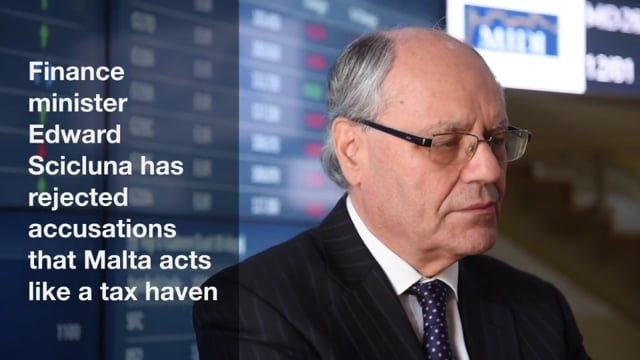[WATCH] Minister refutes charges that Malta is tax haven: ‘We must stop feeling guilty about tax competitiveness’
Finance minister insists that tax competitiveness does not make a country a tax haven


Finance Minister Edward Scicluna has once again dismissed claims that Malta’s tax regime makes the country a tax haven, after a report by the European Green Party said Malta would not be a fitting broker for money laundering and corporate tax rules as it took the helm of the EU presidency.
Scicluna said Malta satisfied the most extensive transparency and its system was not comparable to the secrecy of tax havens.
A 31-page report published Wednesday by the European Greens, took aim at Malta’s taxation refund system, voicing concern that the Malta’s reluctance on tax reforms would slow down EU progress in this regard.
Scicluna however insisted that two fundamental characteristics of tax havens are secrecy and a lack of compliance with authorities. “We are not a tax haven. A tax haven involves secrecy, there is no secrecy in our system and we follow strict rules and have always complied with requests by authorities,” he said.
The minister pointed out that local authorities had “followed up” on both the Panama Papers and Swissleaks, with several companies currently being investigated. “The tax authorities have started 33 investigations into companies linked to the Panama Papers despite there being no cooperation from the ICIJ or even the Panamanian authorities themselves,” said Scicluna.
He insisted that Malta should not “feel guilty about being a tax haven because this completely misinterprets the nature of [the country’s] tax regime.” He said that countries all over the world were finding ways to increase their competitiveness, and that Malta was no different.
“We are seeing this even in the US and in the UK after Brexit. They are saying that they want to make their country more competitive and this is what we are saying. We don’t mind being competitive on tax. Don’t confuse competitiveness with secrecy or a lack of transparency and exchange of information.”
He also disputed suggestions that there was a conflict between Malta’s taxation system, which grants 85% rebates on tax charged to foreign shareholders, and the country being tasked with making progress on issues such as tax avoidance and money laundering during the Maltese presidency. "Malta will carry on where the previous presidency left off and will act as an honest broker," he said.
“We will be leading the council on ATAD2 (EU Anti-Tax Avoidance Directive 2), CCTB (Common Corporate Tax Base) and CCCTB (Consolidated Common Corporate Tax Base), however if there is resistance, there are reasons for it,” Scicluna said.
He was however sceptical about the chances of CCCTB being accepted by all member states. “The CCCTB has already gone through all the phases and failed. Now we are going to try again as honest brokers, being the chair of the council, we will work on it through the process and be very fair in doing so,”
CCCTB was originally proposed in 2011, with limited success, before being relaunched in October 2016. According to the commission’s definition, the Common Consolidated Corporate Tax Base is a “single set of rules to calculate companies' taxable profits in the EU.” The rules would then see the consolidated taxable profits shared between the member states in which the company is active, using an apportionment formula. Each Member State will then tax its share of the profits at its own national tax rate
Malta’s attractive system provides of a number of avenues that allow companies and individuals to achieve “tax efficiency” (read paying as little tax as legally possible).
One option available to foreign shareholders in Maltese companies is a tax refund on their dividends. A company registered in Malta pays a rate of 35% on the profits it generates, with the remainder is distributed as dividends. Any foreign shareholders of the company can ask for a tax refund – typically about 85% the amount paid in tax – which is paid back directly to the shareholder. This means that while all companies are paying the normal tax rate, any foreign shareholders pay an effective tax rate as low as 5% and some cases 0% on cash paid out as dividends.






.jpg)
















